#star trek and all of the like four episodes of the original man from UNCLE ive managed to watch. im probably forgetting more but SHRUGGGG
Note
HAPPY BIRTHDAYYYY!! what do you think influenced u the most (indirectly or directly) when making your specific ocs? i always like seeing people lay out their inspirations
THANK U !!!!!!!!
also i LOVE this question. im trying to be more cognizant when i feel like something inspires me because its actually really hard for me to list any specific examples !!! im under no illusion that anything i make is "100% original" or that outside observers wouldnt be able to trace it back to certain works or concepts or artists, so on and so forth, i am just VERY bad at making the connection myself, lol. i also tend to forget like every single thing ive ever watched or read the minute
UMM ill stick with dove because i CAN remember specific influences that caused me to make him. the first was samurai jack (the show and the character). im not going to derail this ask by opining how often genndy tartakovsky disappoints me with his choices across his entire body of work and how i think if i got to know him in real life i wouldnt be able to stand him, the fact of the matter is samurai jack had a huge impact on me as a kid and i got caught up in the season 5 hype so hard i just had to make a guy about it (not a fan oc, crucially). ive always loved "fish out of water" stories and to me the temporal element is an especially fun way to do it because. aough im having trouble articulating this. people have just always been people i guess, for better and for worse, and everything in between. thats just something i personally think about a lot and its a really good theme to explore in stories, to obvious bias
so anyways i loved jack so much i wanted to make my own guy who was witnessing shit his brain could just barely comprehend but he was so focused on his goal he just kind of made himself go "well, no time to focus on that" and then continue to kind of run on the narrative hamster wheel each week when the achievement of that goal is ultimately yanked from him, in one way or another
the other thing that helped me refine it a bit wassss probably cowboy bebop ? not any particular character, just the show in its entirety. this one's way harder for me to explain. i feel like if you watch the show then you should hopefully see what im saying, but maybe not. also i had dropped dove and his story pretty hard for maybe like a year or two and then i watched cowboy bebop and it somehow instantly rekindled my passion to start it up again and more heavily rework it, so. im sure if i ever put it out one day maybe people will pick up on that. who's to say !
as for why he's a knight: i like them. theyre sexy and cool
#his story more broadly like the setting also is just inspired by more like#pulpy genre faire. sci fi and spy thrillers#star trek and all of the like four episodes of the original man from UNCLE ive managed to watch. im probably forgetting more but SHRUGGGG#oc tag#original tag#dove
3 notes
·
View notes
Text
Robert Hooks
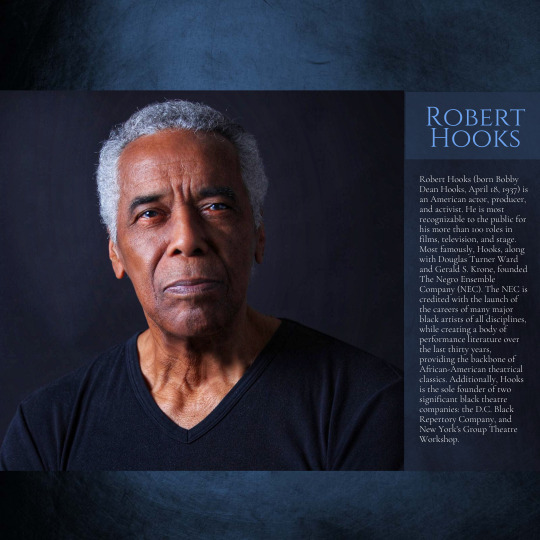
Robert Hooks (born Bobby Dean Hooks, April 18, 1937) is an American actor, producer, and activist. He is most recognizable to the public for his more than 100 roles in films, television, and stage. Most famously, Hooks, along with Douglas Turner Ward and Gerald S. Krone, founded The Negro Ensemble Company (NEC). The NEC is credited with the launch of the careers of many major black artists of all disciplines, while creating a body of performance literature over the last thirty years, providing the backbone of African-American theatrical classics. Additionally, Hooks is the sole founder of two significant black theatre companies: the D.C. Black Repertory Company, and New York's Group Theatre Workshop.
Biography
Early life
The youngest of five children, Hooks was born in Foggy Bottom, Washington, D.C. to Mae Bertha (née Ward), a seamstress, and Edward Hooks who had moved from Rocky Mount, North Carolina with their four other children, Bernice, Caroleigh, Charles Edward "Charlie", and James Walter "Jimmy". Named Bobby Dean Hooks at birth, Robert was their first child born "up-north" and the first to be born in a hospital. His father, Edward, died in a work accident on the railroad in 1939.
Hooks attended Stevens Elementary School. In 1945, at the insistence of his sister Bernice who was doing community arts outreach for youngsters at Francis Junior High School, he performed the lead in his first play, The Pirates of Penzance, at the age of nine. From the ages of 6 to 12, Bobby Dean journeyed with his siblings to Lucama, North Carolina to work the tobacco fields for his uncle's sharecropping farm as a way to help earn money for the coming school year in D.C.
In 1954, just as Brown vs. Board of Education was being implemented in the north, he moved to Philadelphia to be with his mother, her second husband, and his half-sister, Safia Abdullah (née Sharon Dickerson). Hooks experienced his first integrated school experience at West Philadelphia High School. Hooks soon joined the drama club and began acting in plays by William Shakespeare and Samuel Beckett. He was graduated in 1956, passing on a scholarship to Temple University in order to pursue a career as a stage actor at the Bessie V. Hicks School of Theatre (alongside Charles Dierkop and Bruce Dern, with whom he second-acted plays doing their pre-Broadway tryouts in Philadelphia) while working at Browning King, a men's tailor shop at Fourteenth and Chestnut streets.
Career
Having trained at the Bessie V. Smith School of Theatre in Philadelphia, and after seeing A Raisin in the Sun in its Philadelphia tryout in February 1959, Hooks moved to New York to pursue acting. In April 1960, as Bobby Dean Hooks, he made his Broadway debut in A Raisin in the Sun replacing Louis Gossett, Jr. who would be doing the film version. He then continued to do its national tour. He then stepped into the Broadway production of A Taste of Honey, replacing Billy Dee Williams; then repeating the same national tour trajectory as he had done for "Raisin..." the previous year. In early 1962 he next appeared as the lead in Jean Genet's The Blacks, replacing James Earl Jones as the male lead, leaving briefly that same year to appear on Broadway again in Tiger, Tiger, Burning Bright before stepping back into the lead role in The Blacks in 1963. He then returned to Broadway, first in Ballad for Bimshire and then in the short-lived 1964 David Merrick revival of The Milk Train Doesn't Stop Here Any More (as a character created by Tennessee Williams for this revival) and starring Tallulah Bankhead and Tab Hunter in his only stage performance. Immediately thereafter, in March 24, 1964 he originated the role of Clay in Amiri Baraka's Dutchman. With this play, on the advice of Roscoe Lee Brown, Hooks became known as, Robert Hooks. He also originated roles on the New York stage in Where's Daddy? for which he won the Theatre World Award and he was nominated for Best Male Lead in a Musical for Hallelujah Baby while he was simultaneously starring in David Susskind's N.Y.P.D.—the first African American lead on a television drama.
In 1968 Hooks was the host of the new public affairs television program, Like It Is.
Hooks was nominated for a Tony for his lead role in the musical, Hallelujah, Baby!, has received both the Pioneer Award and the NAACP Image Award for Lifetime Achievement, and has been inducted into the Black Filmmakers Hall of Fame. He also won an Emmy for his PBS special, Voices of Our People.
Significant roles for which Hooks is known include Reeve Scott in Hurry Sundown (1967), Mr. T. in the blaxploitation film Trouble Man (1972), grandpa Gene Donovan in the comedy Seventeen Again (2000), and Fleet Admiral Morrow in Star Trek III: The Search for Spock (1984). He also appeared on television in an episode of the NBC crime drama series The Eddie Capra Mysteries in 1978 and portrayed Doctor Walcott in the 1980s television series Dynasty.
Activism
Arts and Culture
In 1964, as a result of a speaking engagement at the Chelsea Civil Rights Committee (then connected to the Hudson Guild Settlement House) he founded The Group Theatre Workshop (GTW), a tuition-free environment for disadvantaged urban teens who expressed a desire to explore acting. Among the instructors were Barbara Ann Teer, Frances Foster, Hal DeWindt, Lonne Elder III, and Ronnie Mack. Alumni include Antonio Fargas, Hattie Winston, and Daphne Maxwell Reid.
The Group Theatre Workshop was folded into the tuition-free training arm of the The Negro Ensemble Company (NEC) founded in 1967 with Douglas Turner Ward and Gerald S. Krone with a $1.3 million grant from the Ford Foundation under the auspices of W. McNeil Lowry.
From 1969-1972, Hooks served as an original board member of Black Academy of Arts and Letters (BAAL) (located in New York) alongside C. Eric Lincoln, President; John O. Killens, Alvin F. Poussaint, and Charles White. Chartered by the State of New York, BAAL's mission was to bring together Black artists and scholars from around the world. Additional members included: Julian Adderley, Alvin Ailey, Margaret Walker, James Baldwin, Imamu Baraka, Romare Bearden, Harry Belafonte, Lerone Bennett, Arna Bontemps, Ossie Davis, Ruby Dee Davis, St. Clair Drake, Ernest Dunbar, Katherine Dunham, Lonne Elder III, Duke Ellington, Alex Haley, Ruth Inge Hardison, Vertis Hayes, Chester Himes, Lena Horne, Jacob Lawrence, Elma Lewis, Henry Lewis, Paule Marshall, Donald McKayle, Arthur Mitchell, Frederick O’Neal, Gordon Parks, Sidney Poitier, Benjamin Quarles, Lloyd Richards, Lucille D. Roberts, and Nina Simone.
In response to the violence in his home town of Washington, D.C. in the wake of the Rev. Dr. Martin Luther King, Jr.'s assassination, and aided by a small grant from the Eugene and Agnes E. Meyer Foundation, Hooks took a leave of absence from the Negro Ensemble Company to create The D.C. Black Repertory Company (DCBRC, 1970-1981). As Founder and Executive Director, the DCBRC was intended as a further exploration of the ability of the arts to create healing. The a capella group Sweet Honey in the Rock was created and developed within its workshop process.
The Inner Voices (Lorton Prison arts training program, 1971) proved to be a result of the beneficial effect of the DCBRC in the D.C. area. In response to a direct plea from an inmate, Rhozier "Roach" Brown, who was serving a life sentence in Lorton, Hooks' D.C. Black Repertory Company structured the first prison-based arts program in the United States. While it is the norm now, it was then a revolutionary attempt at rehabilitation through the arts. Eventually The Inner Voices performed more than 500 times in other prisons, including a Christmas special entitled, "Holidays, Hollowdays." Due to Roach's work, President Gerald Ford commuted his sentence on Christmas Day, 1975.
His relocation to the West Coast redirected Hooks' approach to parity in the arts with his involvement with The Bay Area Multicultural Arts Initiative (1988) as a board member and grant facilitator-judge. Funded by monies from a unique coalition made up of the San Francisco Foundation (a community foundation); Grants for the Arts of the San Francisco Hotel Tax Fund, and The National Endowment for the Arts, the function of this organization was the funding of deserving local multicultural arts organizations.
In 1992, Hooks co-founded (with writer Lonne Elder III) Arts in Action. Located in South Central Los Angeles, this was a film and television training center established to guide individuals who aspired to careers in film production. It formulated strategies and training for securing entry-level jobs. Courses included: career development workshops; pre-production and production for film and television; creative problem solving in production management; directing for stage and screen—principles and practices; also the craft of assistant directors, script supervisor, technicians, wardrobe, make-up, etc.
The Negro Ensemble Company of Los Angeles (NEC-LA) (1994-1997) was created because so many New York members and original members had relocated to the west coast. Hooks, as founder and executive director enlisted alumni from his New York Negro Ensemble Company to serve as board members: Denise Nicholas, Denzel Washington, James Earl Jones, Laurence Fishburne, Richard Roundtree, Samuel L. Jackson. NEC-LA's goal was to be a new and innovative multi-ethnic cultural project that strived to achieve the community effectiveness and professional success of its parent organization.
Personal life
Hooks is the father of actor, television and film director Kevin Hooks. He married Lorrie Gay Marlow (actress, author, artist) on June 15, 2008. Previously, he was married to Yvonne Hickman and Rosie Lee Hooks.
Awards
1966 - Theatre World Award (1965–66 ) for "Where's Daddy?" (The Billy Rose Theatre)
1979 - American Black Achievement Award - Ebony Magazine
1982 - Emmy Award for Producing (1982) Voices of Our People: In Celebration of Black Poetry (KCET-TV/PBS)
1966 - Tony Nomination, Lead Role in a Musical for Hallelujah, Baby
1985 - Inducted into The Black Filmmakers Hall of Fame, recipient Oscar Micheaux Award (1985)
1986 - March 2nd declared Robert Hooks Day by the City of Los Angeles, Mayor Tom Bradley
1987 - Excellence in Advertising and Communications to Black Communities from CEBA (Excellence in Advertising and Communications to Black Communities)
2000 - Honorary Doctor of Humane Letters, Honoris Causa honorary degree, Bowie State University
2000 - May 25th declared Robert Hooks Day in Washington, D.C.
2005 - Beverly Hills/Hollywood Chapter NAACP Image Award for Lifetime Achievement
2005 - Beverly Hills/Hollywood Chapter NAACP Trailblazer Award to the Negro Ensemble Company
2005 - Trailblazer Award – City of Los Angeles
2006 - The Black Academy of Arts and Letters (TBAAL), Lifetime Achievement Award (Dallas)
2007 - The Black Theatre Alliance Awards / Lifetime Achievement Award
2015 - Living Legend Award (2015) National Black Theatre Festival
2018 - October 18th proclaimed Robert Hooks Day by Mayor Muriel Bowser, Washington, D.C.
2018 - Hooks is entered into The Congressional Record by the Hon. Eleanor Holmes Norton, September 4, 2018, Vol. 164
2018 - Visionary Founder and Creator Award - D.C. Black Repertory Company on its 47th anniversary
Acting Credits
Film
Sweet Love, Bitter (1967) .... Keel Robinson
Hurry Sundown (1967) .... Reeve Scott
Last of the Mobile Hot Shots (1970) .... Chicken
Carter's Army (1970) .... Lt. Edward Wallace
Trouble Man (1972) .... Mr. T
Aaron Loves Angela (1975) .... Beau
Airport '77 (1977) .... Eddie
Fast-Walking (1982) .... William Galliot
Star Trek III: The Search for Spock (1984) .... Admiral Morrow
Passenger 57 (1992) .... Dwight Henderson
Posse (1993) .... King David
Fled (1996) .... Lt. Clark
10 notes
·
View notes
Photo

Anon I’m ASSUMING that these are from the same person; apologies if they are not
I would say that my feelings are similar to yours, but not quite identical ...

Disney’s handling has been imperfect, and some of the mistakes have been made the highest level (I know that people give Kathleen Kennedy a hard time, but if rumor is to be believed, some of the interference that made IX kind of weird came from higher than that)
for example, Kennedy said in an interview that she tries to find people who just make big, successful movies to make sure that these are also big, successful movies. I can understand that as being a safe bet from a business stand point, but that’s not the same thing as finding someone passionate about very specifically telling good, new Star Wars stories, which we did not really get in the Sequel Trilogy
(one of the most common theories that I saw from TLJ apologists was that people didn’t like that it was new/different than what they were expecting, which was really not the issue for me or my friends. Also it was just a speedrun of parts of Episodes V and VI)
I think that I’m “too close” to Star Wars to see it as a financial asset rather than a beloved universe full of characters and stories that I adore, but I don’t think that “literally just rehash the Original Trilogy for two movies and barely acknowledge any other part of Star Wars until IX” was a good idea
Rey deserved her own story. and Luke deserved to not be retroactively robbed of his
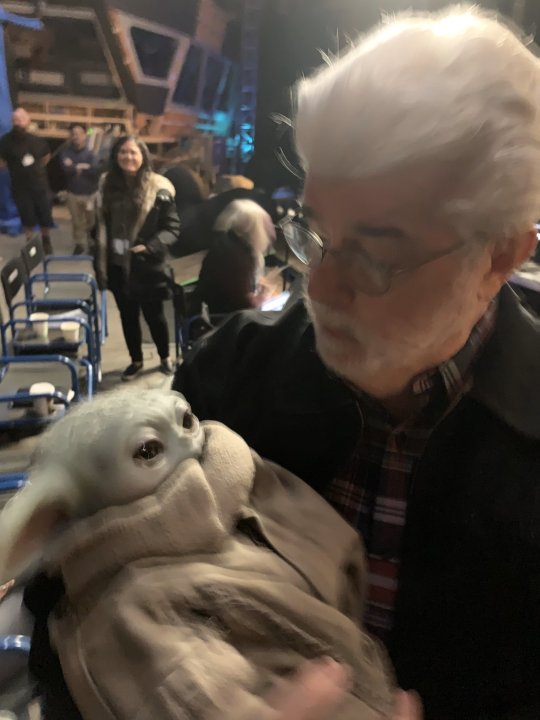
as for George Lucas, I do think that years of backlash over the Prequels sucked the fun out of it for him. Also, who doesn’t want four billion dollars? it was a sweetheart deal for Disney, of course
the sad thing is that this meant the end of Clone Wars, because Disney took one look at Lucasfilm’s budget and was like “OH NO YOU CANNOT SPEND THAT KIND OF MONEY ON A CARTOON” which is why Season 6 was paid for by Netflix and why Maul: Son of Dathomir was a comic
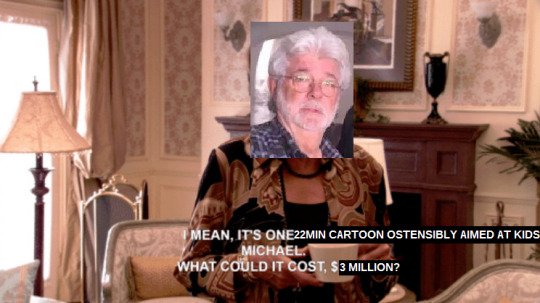
I love Star Wars Rebels and I’m not trying to knock the show at all, but the budgetary difference was palpable. Clone Wars did have it a little easier because of the Clone Troopers (all having the same face), but on Rebels, you notice that 90% of the Imperials are the same guy wearing a hat with his visor obscuring most of his face. market scenes show just a few people (but plenty of Storm Troopers)
the designs of the main characters -- Ezra, Hera, Sabine, Zeb, Kallus, Thrawn, Kanan, etc -- are great and loving and detailed and most of those change a little over time, but there’s a reason that we only see so many planets on Rebels. look at the huge armies and crowds in Rebels. my friend @drunkkenobi is the first who pointed out to me that in Clone Wars, you sometimes see lines of ships (Space Traffic) and each ship in line will be unique, distinct from the others
it’s not Rebels’ fault that they didn’t have that kind of budget. that’s also why their space battles (and space ships) never quite look right. meanwhile, for Clone Wars, if they wanted a particular scene or ship that went over their planned budget, all that they had to do was ask Uncle George

eccentric billionaires funding expensive media isn’t necessarily the most sustainable model for storytelling, but it sure worked out well for Clone Wars and for The Expanse
(Jeff Bezos personally called up the head of Amazon Prime programming, who had already been considering acquiring the extremely good but expensive show, and was like “hey the cast from this show is at a thing where I am, I’d love to just tell them that their show is saved, give me it?” and we saw as many new locations in Season 4 as we did in the first three seasons)
but streaming -- where you actually get money directly from customers who then, through their activity on your platform, show you exactly what they want to see aka what is keeping them on your platform -- offers a new opportunity for high quality genre media. remember, scifi and fantasy were EVERYWHERE in the ‘90s and the early aughts, and then because too expensive for regular TV unless they had huge audiences. only through streaming do we have these new Star Treks, The Witcher, and the real possibility of a new Stargate series
why do I bring up streaming? because
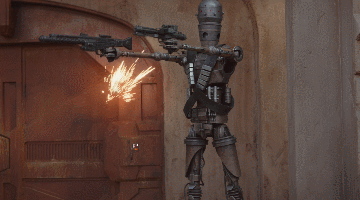
The Mandalorian goes to show that Disney can 100% do good Star Wars. Rebels was good, despite its budget, but can you imagine how much better it would have been if it had aired on Disney+
as with the DC movies (three of which are good and I’m also excited for Birds of Prey), the solution to the our-movies-made-a-lot-of-money-but-aren’t-strictly-speaking-good is literally just “let the people who do the cartoons make the movies”
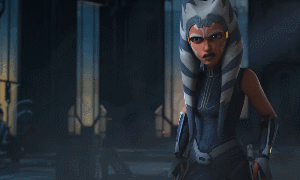
and now we’re getting a final, seventh (half) season of Clone Wars! twelve episodes looking better than the show has ever looked!!
if you’re like me, you probably thought to yourself “gee, only 12?” and, cynically, you figured that it’s a trick -- announced at ComicCon in 2018 to build up the first wave of hype for Disney+
and it is ... but it 100% worked on me, I signed up for Disney+ and will pay anything for Clone War
my HOPE is that this is a test run to see if people really like high-quality animated Star Wars stories enough to continue with it. there’s only so much clone wars that one can cover (my suspicion is that we will see Ahsoka fake her death during Order 66 in these eps, so yep, that’s the end of the Clone Wars right there)
imagine a well-written series with everything that Clone Wars had in terms of content and visual quality, but it’s set after Episode IX. to my frustration, IX ends with effectively the same worldstate as VI which essentially means that nothing much happened in the Sequel Trilogy. but imagine a series set after IX. we could see a new set of (Force-wielding) characters. we could see Rey, Finn, Poe, and Rose during some episodes. Rose could finally get to do something that’s not an insulting fool’s errand (she deserves so much better!!!!!)
we don’t need a new Big Scary Empire/First Order thing, just organized crime and pirates and Hutts and bounty hunters and individual planet systems going to war as the characters try to assemble a NEW New Republic (gods I hate the unchanged worldstate)

now, I know that Star Wars Resistance is not ... reassuring. this is the only screencap that I have from it because I couldn’t get into it. it’s not the animation (I enjoyed Tron Uprising and Iron Man: Armored Adventures and this is the same kind of deal), but three things:
-I watch Star Wars for the Force primarily; other stuff can be cool but I need the Force
-I will never care about ships racing and really I don’t care about an individual ship flying; I’m a Command Ship kind of space nerd
-apparently the writing doesn’t improve much during the first season. people tell the main character to not do something, then he does it, and disaster ensues. that’s ... it’s fine, it’s fine to exist as a show, it’s just not for me
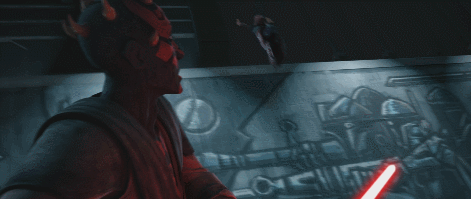
obviously, not all Star Wars media is for me, but when something -- like TLJ or the Sequel Series as a whole (even though VII and IX are enjoyable) or Resistance -- disappoints me, I would never accuse it of “ruining Star Wars”
Star Wars is a whole franchise. the breadth of canon isn’t all wiped away by some disappointments. was the MCU ruined by Age of Ultron? no. it was a bad movie but from the same franchise that gave us The Winter Soldier and Thor Ragnarok. hell, Dawn of Justice doesn’t “ruin” Wonder Woman or Aquaman or Shazam. bad movies aren’t contagious
for the past several years, the Entitled Dude crowd has felt empowered. they were radicalized in the altright/redpill/MGTOW/meninist/nazi/gamergate/comicsgate/etc spheres of the internet and now they just have a reflex where they see any sort of representation and decry it as “SJW,” which they also seem to think is a bad thing
in the same way that well-meaning people on tumblr can get radicalized into being antis/puriteens, people with certain vulnerabilities on reddit or youtube can get sucked into a world that tells them that they are the default and that other people existing is “political” in media and in real life, and that people being upset by outright cruelty towards them is both funny and means that the cruel person is the victor. they need therapy and studios need to not listen to them
unfortunately, sometimes there are movies that are bad despite having things like solid representation. Ghostbusters 2016 was a delight, but my friends and I with whom I saw TLJ (all of us queer feminists) left the theater angry. we’ve bitten our tongues a lot (even if it seems otherwise) because publicly criticizing the film too often leads some incel monster to chime in with agreement, and we’re just like

the redpillgate crowed et all is a natural ally of conservative white evangelicals, even though the former group is generally made up of New Atheists (the short version is atheists who hold socially conservative views because racism/misogyny/transphobia benefit them without using christianity as an excuse). it’s kind of like how terfs will side with conservative hate groups because, though they’re natural enemies, they both despite trans people just for existing
unfortunately, when you’re looking at who went to see a movie or who hated it, not everyone posts with an ID card saying exactly their demographic. which is only going to make studios like Disney even more nervous about including queer content in Star Wars and in the MCU (I mean real queer content with characters whose names don’t have to be searched on a wiki)
that was a bit of a tangent, but yeah. sorry if I missed anything
14 notes
·
View notes
Text
LUCY GETS LUCKY
March 1, 1975
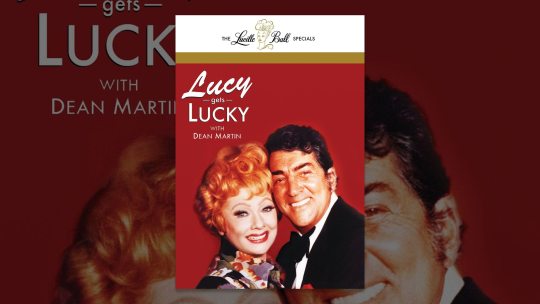

Directed by Jack Donohue ~ Written by Robert O'Brien
Synopsis
Lucy Collins comes to Las Vegas to see Dean Martin perform at the newly-opened MGM Grand Hotel. When Lucy's reservation falls through, she hears that Martin is doing a special show for employees and promptly gets herself hired. Naturally, Lucy causes chaos in each department she is transferred to: valet parking, cocktail waitress, Keno girl. But Lucy gets lucky when Dean Martin takes a liking to her and arranges a front row seat at his show.
Cast
Lucille Ball (Lucy Collins) was born on August 6, 1911 in Jamestown, New York. She began her screen career in 1933 and was known in Hollywood as ‘Queen of the B’s’ due to her many appearances in ‘B’ movies. With Richard Denning, she starred in a radio program titled “My Favorite Husband” which eventually led to the creation of “I Love Lucy,” a television situation comedy in which she co-starred with her real-life husband, Latin bandleader Desi Arnaz. The program was phenomenally successful, allowing the couple to purchase what was once RKO Studios, re-naming it Desilu. When the show ended in 1960 (in an hour-long format known as “The Lucy-Desi Comedy Hour”) so did Lucy and Desi’s marriage. In 1962, hoping to keep Desilu financially solvent, Lucy returned to the sitcom format with “The Lucy Show,” which lasted six seasons. She followed that with a similar sitcom “Here’s Lucy” co-starring with her real-life children, Lucie and Desi Jr., as well as Gale Gordon, who had joined the cast of “The Lucy Show” during season two. Before her death in 1989, Lucy made one more attempt at a sitcom with “Life With Lucy,” also with Gordon.
Lucy Collins lives in Los Angeles and took the bus to Las Vegas.
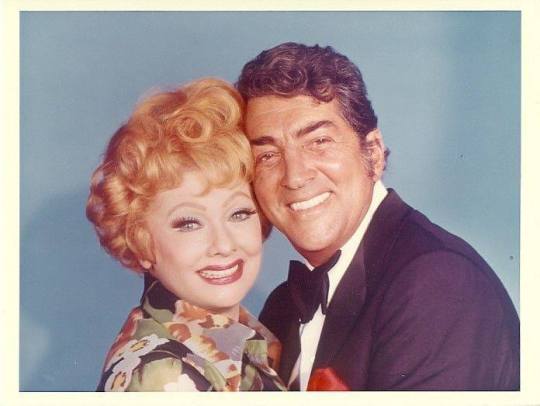
Dean Martin (Himself) also played himself (and his stunt man doppelganger Eddie Feldman) in “Lucy Dates Dean Martin” (TLS S4;E21) in 1966. He was born Dino Paul Crocetti in Steubenville, Ohio, in 1917. He made his screen debut in a short playing a singer in Art Mooney’s band, but his first big screen role was 1949’s My Friend Irma with Jerry Lewis. This began a partnership that would be one of the most successful screen pairings in cinema history. Later, he also worked frequently members of “the Rat Pack”: Frank Sinatra, Joey Bishop, Peter Lawford, and Sammy Davis Jr. His persona was that of a playboy, usually seen with a glass of booze and a cigarette. Martin and Lucille Ball appeared on many TV variety and award shows together. He died on Christmas Day in 1995 at age 78.
Jackie Coogan (Gus L. Mitchell, below center) was a child actor. In “Ricky’s Screen Test” (ILL S4;E6) Lucy Ricardo hopes Little Ricky will be “the next Jackie Coogan.” Coogan was once married to Flower Parry, who was a frequent extra on “I Love Lucy.” He is, of course, best remembered as Uncle Fester on TV’s “The Addams Family” (1964-66). He made two appearances on “The Lucy Show” and on one episode of “Here's Lucy.” He died in 1984 at age 69.
Gus Mitchell is head of personnel at the MGM Grand.
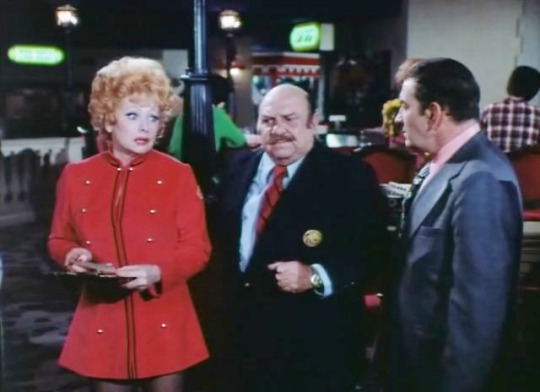
Bruce Gordon (Max Siegel / Vogel, above right) is best known for playing Frank Nitti on the Desilu series “The Untouchables” (1959-63). He played a version of the character when “The Lucy Show” parodied “The Untouchables” in 1966. He was also seen in “Lucy and the Ex-Con” (HL S1;E15) in 1969.
Although the final credits list him as Max Vogel, in the special Gordon clearly says his name is Max Siegel. He is a toy company executive with a business that has been suffering due to shipping problems with their baby dolls.
Paul Picerni (Packy West) was a also cast member of Desilu’s “The Untouchables” from 1959 to 1963. He was seen in four episodes of “Here’s Lucy.”
Lee Delano (Chuck Murdock) previously appeared on the Desilu shows “Star Trek” and “Mission: Impossible.”
Packy and Chuck are Max's gambling buddies.
Ken Lane (Himself) was Dean Martin's musical arranger, pianist, and, alongside Nelson Riddle, also served as composer for this special, although he was uncredited for that work.
Hal England (Dean Martin's Arranger) was an experienced Broadway actor who began screen acting in 1960. He previously appeared in “Lucy and the Astronauts” (HL S4;E5) and “My Fair Buzzi” (HL S5;E13). England died in 2003.
Joey Forman (Eddie) had a nightclub act with Mickey Rooney during the 1950s that led to his appearance on many TV variety shows. He will also appear in “Lucy Calls the President” in 1979.
Eddie is the head of valet parking at the MGM Grand.
Gino Conforti (Antonio) began his TV acting career in 1968 and has been continually working since, although mostly as one-off characters. He had a recurring role as Felipe on “Three’s Company” from 1980 to 1982, a series Lucille Ball admired. He played the burglar in “Lucy Plays Cops and Robbers” (HL S6;E14) in 1974. He will also be seen in and “Three for Two” later in 1975.
Antonio is the Maitre D' at the Celebrity Room. His name is never mentioned in the dialogue.
Vanda Barra (Gladys) made over two dozen appearances on “Here’s Lucy” as well as appearing in Ball’s “Three for Two” (with Jackie Gleason). She was seen in half a dozen episodes of “The Lucy Show.” Barra was Lucille Ball’s cousin-in-law by marriage to Sid Gould.
Gladys is the desk clerk (possibly owner) of the Cactus Flower Motel.
Sid Gould (Taxi Driver) made more than 45 appearances on “The Lucy Show” and nearly as many on “Here’s Lucy.” Gould (born Sydney Greenfader) was Lucille Ball’s cousin by marriage to Gary Morton. He was previously in the Lucille Ball Special “Happy Anniversary and Goodbye.”
Gary Morton (Al) was a comedian who worked the famed ‘Borscht Belt’ in the Catskills Mountains. He met Lucille Ball shortly after her divorce from Desi Arnaz and they married in November 1961. At her request, Morton gave up his nightclub career and became a producer of “The Lucy Show.” Morton also served as a warm-up comic for the show’s studio audience. He is also Producer of this special. Morton passed away in 1999.
Al is a pit boss at the MGM Grand. His name is not spoken in the dialogue.
Bonnie Boland (Sally) played Mabel on “Chico and the Man.” The last of her six episodes aired two weeks after this special was first broadcast.
Sally is a waitress at the MGM Grand Coffee Shop.
Jack Donohue (Ralph) was the director of this special, as well as many episodes of “The Lucy Show” and “Here's Lucy.” He would sometimes make cameo appearances in the episodes he directed.
Joan Swift (Dawn) made six appearances on the “The Lucy Show” as well as two episodes of “Here’s Lucy.” This special is her final screen credit.
Dawn is Ralph's wife. Lucy parks their car when they arrive at the MGM Grand.
Judith Wright (Peggy, Keno Girl)
Jane Aull (Keno Girl) was a background performer making her fifth and final screen appearance.
While making a telephone call, the character is mistaken from the back for Lucy.
Jay Jones (Maintenance Man) makes his screen debut with this special.
Roy Rowan (Voice Over Announcer, uncredited) was Lucille Ball’s announcer for all of her sitcoms. He also made occasional on-camera appearances.
During his introductions, Rowan doesn’t use the show's title, but calls it “The Lucille Ball Special.” This was also the case with “Happy Anniversary and Goodbye,” which had nearly identical voice-over announcements introducing the show.
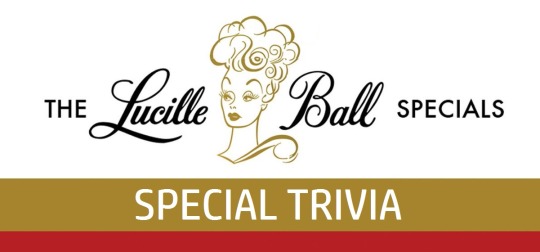
This was Lucille Ball's second primetime special after the end of “Here's Lucy” in 1974. The first was “Happy Anniversary and Goodbye” four months earlier. After playing a character named Norma in that special, Ball is back to playing a character named Lucy. This time her last name is Collins.
In 1953's “Lucy is Matchmaker” (ILL S3;E27), Lucy tried to fix up Eddie Grant with a girl named Sylvia Collins, although the character remained off-screen.
On “The Lucy Show” Viv’s on-again-off-again boyfriend was named Eddie Collins.
Collins is the surname assigned to Robert Cummings on a 1972 episode of “Here’s Lucy”.
In the film Follow The Fleet (1936), Lucille Ball’s character is named Kitty Collins.
On a 1966 “The Lucy Show” Mr. Mooney and Lucy Carmichael meet the hip hypnotist Pat Collins (her real name)!
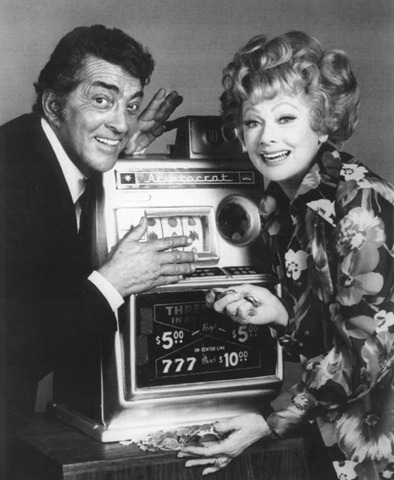
This special is available on DVD from MPI video or can be streamed online. It was originally aired on CBS in the USA and ITV in the UK. Like “Happy Anniversary and Goodbye”, this show is sponsored by Timex, which gets opening title credit.
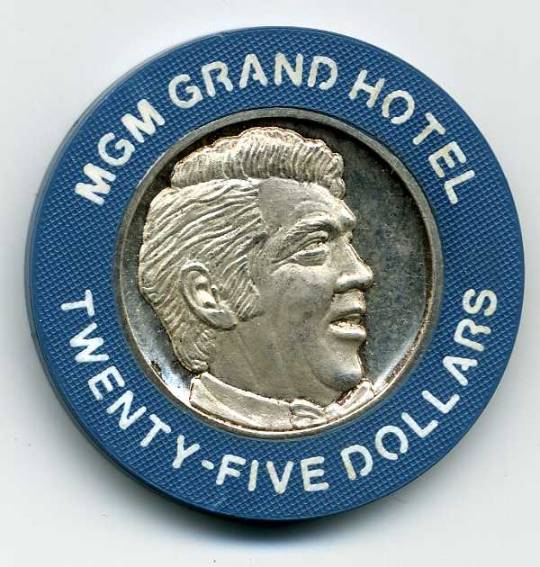
Writer Robert O'Brien had written 54 episodes of “The Lucy Show” and 24 of “Here's Lucy,” many of which were directed by Jack Donohue.
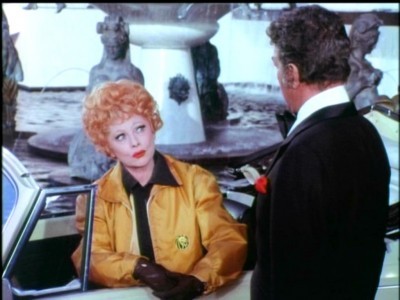
The biggest departure for this special is there is no studio audience or laugh track.
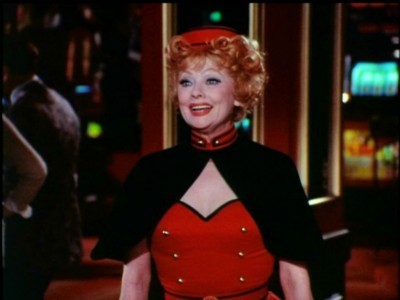
Lucille Ball reunites with many of her “Here's Lucy” production staff, including hairstylist Irma Kusely, prop master Kenneth Westcott, costumer Renita Reachi, production manager William Maginetti, and script supervisor Dorothy Aldworth.
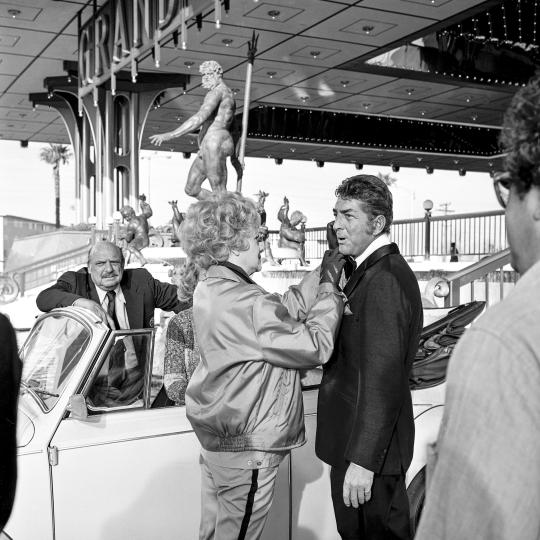
Location shooting was done at the (then) newly opened MGM Grand Hotel in Las Vegas. Scenes set inside the Cactus Flower Motel were shot at Paramount Studios in Hollywood. This is the second time Lucille Ball has shot on location in Las Vegas, the first being at Caesars for “Happy Anniversary and Goodbye.” Although episodes of her television shows were set in the city, actor doubles and second unit footage were used while Ball remained in Hollywood.
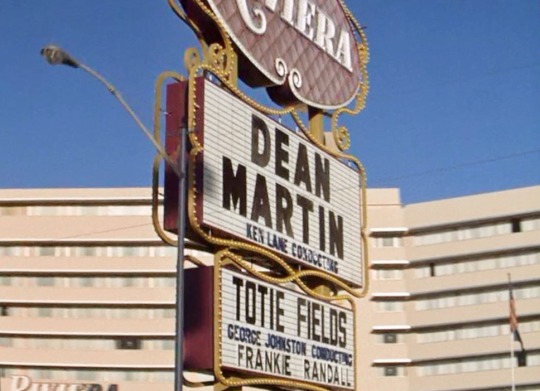
Dean Martin's name was seen on the marquee of the Riviera Hotel when Lucy Carter went to Las Vegas in 1970's “Lucy and Wayne Newton” (HL S2;E22, above), three years before the MGM Grand was built. Lucille Ball first used location footage of Las Vegas in “Lucy Hunts Uranium” (LDCH 1958). Lucy Carmichael also visited the town in 1965's “Lucy Goes to Vegas” (TLS S3;E17), however no establishing or location footage was shot, and the episode was filmed entirely on the Desilu soundstage in Hollywood.
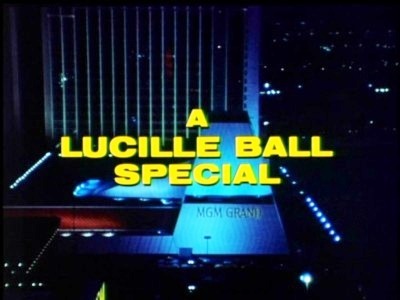
The show opens with a montage of the the Las Vegas strip that includes the marquees of the Caesars Palace, the Flamingo, the Frontier, the Stardust, the Sands, and the Dunes, before ending on the exterior of the MGM Grand. This montage is an aerial view at night, instead of the daytime street view in “Lucy and Wayne Newton” (HL S2;E22).
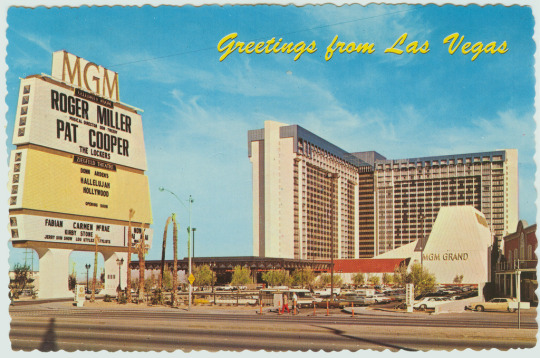
The MGM Grand opened as one of Las Vegas's first mega resorts on December 5, 1973. Dean Martin was the entertainer on opening night. It was the largest hotel in the world at its opening and would remain so for several years. “The Dean Martin Celebrity Roasts” were filmed at the hotel. The property was sold in 1986 and the name was changed to Bally's. The MGM Grand name was transferred to the former Marina Hotel, now known as MGM Grand Las Vegas.
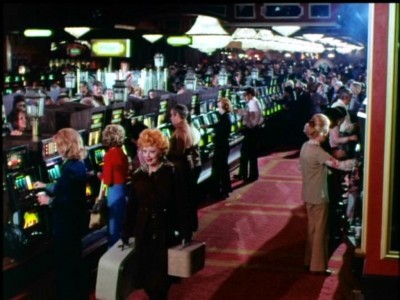
When Lucy Collins arrives at the MGM Grand with suitcases in hand, she walks through the casino and down their 'Hall of Fame' lined with illuminated posters of movie stars. The soundtrack plays a wistful version of “Hooray for Hollywood.”
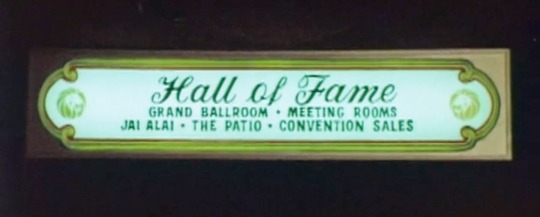
Lucy pauses at posters of Spencer Tracy and Katherine Hepburn;
She blows kisses to Cary Grant, whose poster is alongside Grace Kelly.
She gazes lovingly at photos of Frank Sinatra, Fred Astaire and Ginger Rogers. Rogers played herself on a 1971 episode of “Here's Lucy.”
Lucy does a 'ha-cha-cha-cha' in front of a poster of Jimmy Durante, who Lucy Ricardo disguised herself as in “Lucy Meets Harpo Marx” (ILL S4;E28). Durante later did a brief cameo on a 1966 “Lucy Show.”
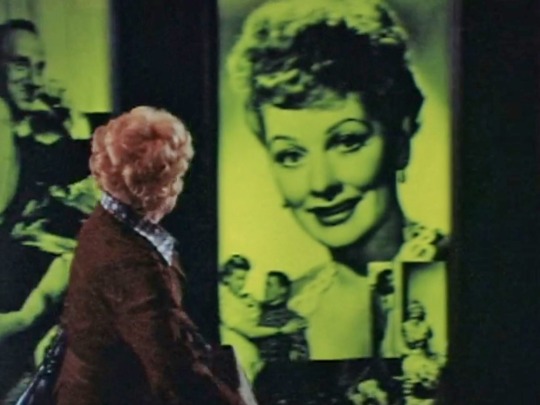
In a meta moment, Lucy Collins then stops and primps her hair in front of a poster of Lucille Ball! Lucy Carter also stood before a poster of Lucille Ball in “Lucy and the Andrews Sisters” (HL S2;E6) and later shared scenes with movie star Ball in “Lucy Carter Meets Lucille Ball” (HL S6;E22). Although her recent film Mame had been released by Warner Brothers, Lucille Ball had done several films with MGM, like The Long, Long Trailer (1954) and Forever Darling (1956).
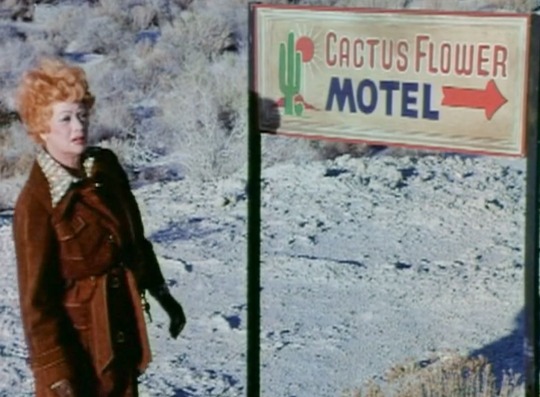
Walking out the employees back entrance and trekking through the desert, it becomes clear that Lucy was only using the MGM Grand lobby as a shortcut to get to her actual lodgings, the Cactus Flower Motel, managed by her friend Gladys (Vanda Barra).
Lucy: (about her dress choices for Dean Martin's opening night) “The other one is older, but its got a Gucci label.”
Gladys: “You have an outfit from Gucci?”
Lucy: “No. Just the label.”
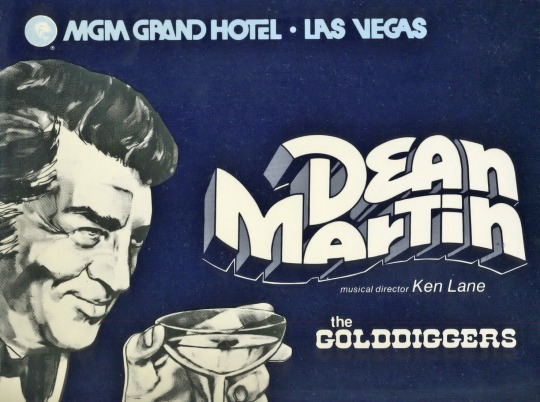
In the MGM Grand coffee shop having a cup of tea in a back booth, Dean Martin sings a few bars of “Volare,” a song written by Franco Migliacci and Domenico Modugno. Martin was one of the first to cover the song in 1958. His orchestra will reprise the song at the end of the special while Lucy and Martin dance.
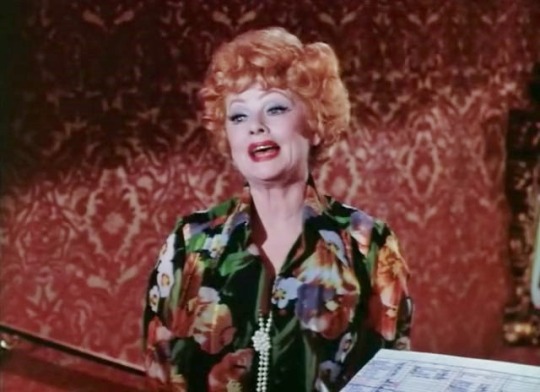
When Lucy phoned for a reservation for Dean Martin's opening night, she lied and said there'd be eight guests. Talking to Antonio the maître d' she must now make excuses for the absence of the seven others.
Mr. and Mrs. Winters are expecting a baby;
Mr. and Mrs. Nichols, Mrs. Winters mother and father, naturally won't be coming either;
Mabel and Henry, Mr. Winters mother and father also aren't coming because of the baby;
Gregory is Mrs. Winters doctor, so he also won't be there;
So it is just Lucy.
Unfortunately, Antonio won't give Lucy a table for one!
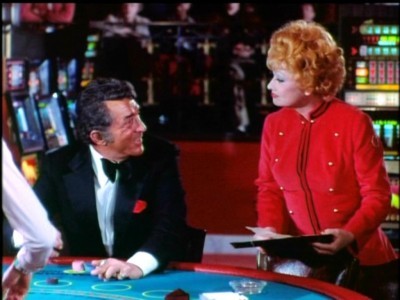
Lucy: “I have been a fan of yours from bobby socks to suphose.”
Dean Martin: “Do you think those suphose would help my problem?”
Lucy: “What's your problem?”
Dean Martin: “I fall down a lot.”
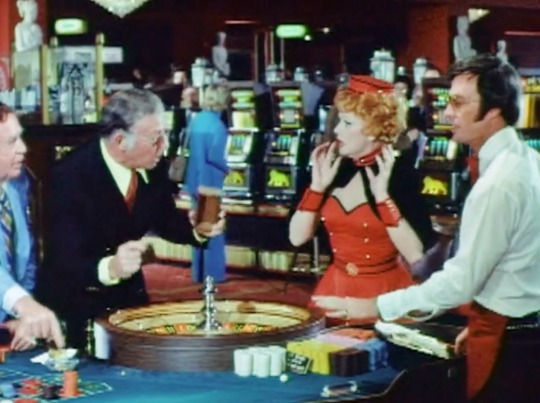
Lucy Collins gets a job as a cocktail waitress and causes chaos at the roulette tables. Lucy Ricardo had some luck (then lost it all) playing roulette in “Lucy Goes to Monte Carlo” (ILL S5;E25). In 1965, Lucy Carmichael had some luck (then lost it all) playing roulette in “Lucy Goes to Vegas” (TLS S3;E17).
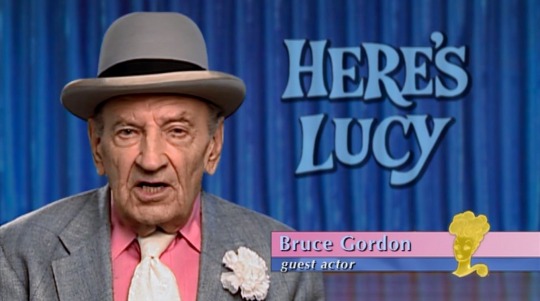
The character of Max Siegel (credited as Vogel) is likely named for gangster Bugsy Siegel, who was primarily responsible for the development of the Vegas strip in the 1950s. The fact that Max is being played by Bruce Gordon, famous for playing real-life gangster Frank Nitti on Desilu's “Untouchables,” pretty much assures the comparison. Naturally, Lucy overhears Siegel and his friends talking about “busted up dolls” and thinks they are talking about women, as the term was often used for females in the Damon Runyon musical Guys and Dolls.
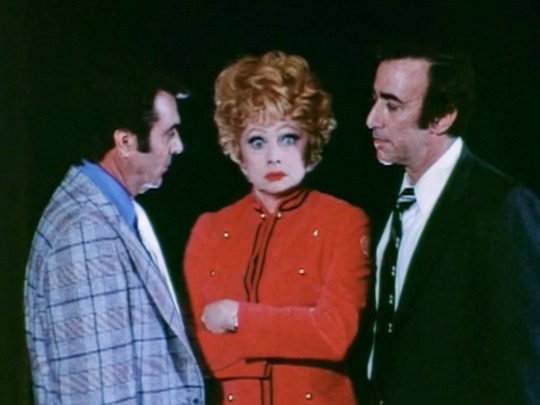
Max Siegel's gambling buddy is played by Paul Picerni, another “Untouchables” alumni. His character name is Packy West, which is an obscure reference to Lucy's pal Bob Hope. In July 1919, a 16-year-old Hope entered the Ohio State Boxing Amateurs tournament under the name “Packy East,” a nod to light and welterweight boxer Patrick “Packy” McFarland and Hope's own school, “East” High.
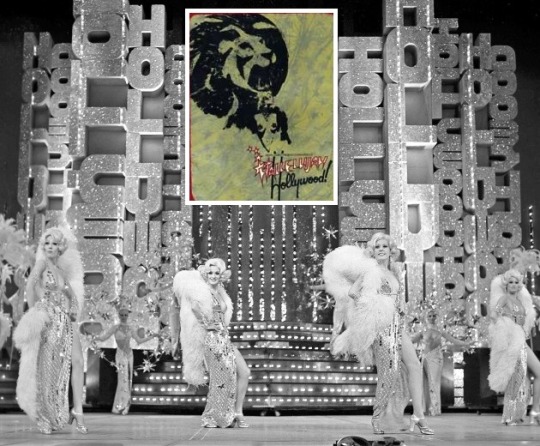
A chase sequence involving Lucy and Max Siegel's gambling buddies ends up backstage at “Hallelujah Hollywood,” a lavish stage show conceived, produced, and directed by Don Arden, It was a 3 million dollar tribute to classic MGM Hollywood musicals which played The Ziegfeld Room (which at the time was the largest stage in the world, with the largest backstage area in the world), at the MGM Grand Hotel in Las Vegas. The show opened in 1974, and ran until 1980. Its flamboyant finale was a tribute to the Ziegfeld Follies, featuring The Grand Stairway and The Great Ziegfeld Walk. The show featured over a 700 costumes (designed by Ray Aghayan and Bob Mackie). Lucille Ball played a lavishly attired Ziegfeld showgirl in the 1946 MGM film Ziegfeld Follies.
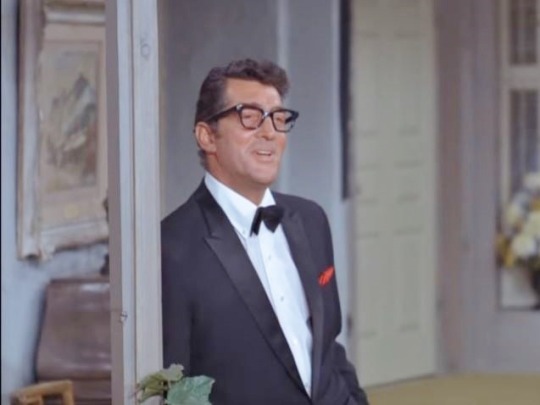
On stage with Lucy in the front row, Dean sings “Everybody Loves Somebody,” a song written in 1947 by Sam Coslow, Irving Taylor. Although it had been recorded by others, it was Dean Martin’s 1964 recording that hit #1 on the Billboard Pop Charts. He also sang it in “Lucy Dates Dean Martin” (TLS S4;E21, above). He then launches into “Tie a Yellow Ribbon 'Round the Old Oak Tree” written by Irwin Levine and L. Russell Brown in early 1973. It was a #1 hit for Tony Orlando and Dawn. The song was referred to by Steve Lawrence (but not sung) in “Lucy, the Peacemaker” (HL S6;E3).
This Date in Lucy History - March 1
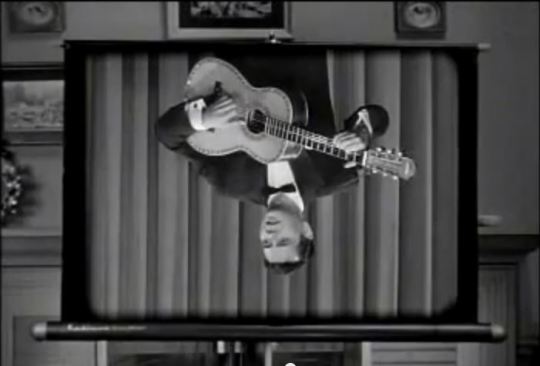
“Home Movies” (ILL S3;E20) – March 1, 1954
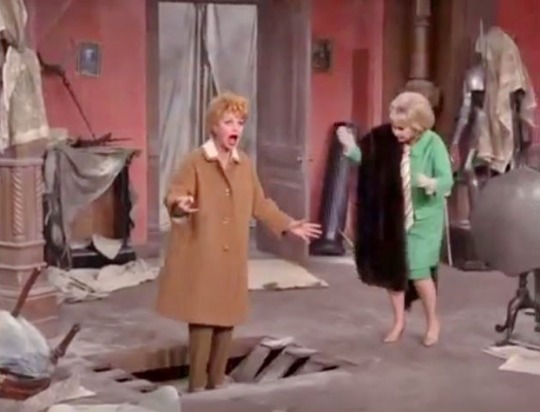
“Lucy and the Old Mansion” (TLS S3;E22) – March 1, 1965

This is one of the best post-”Lucy” outings of Lucille Ball's career. The reason is simple: She sticks close to what she does best – and she does it without the cloying addition of a laugh track. Had she decided to call the character Lucy Carter instead of Lucy Collins, it might well have been billed as a “Here's Lucy” special. As Lucy Carmichael, she did a similar filmed special titled “Lucy in London” during “The Lucy Show.” Lucy Carmichael dated Dean Martin for one episode, so it would only have worked with Lucy Carter. Perhaps Ball thought people wouldn't remember “Here's Lucy” a year later. But whatever she's named, this special gives us old school, celebrity-hunting, anything-goes, Lucy and it is terrific!
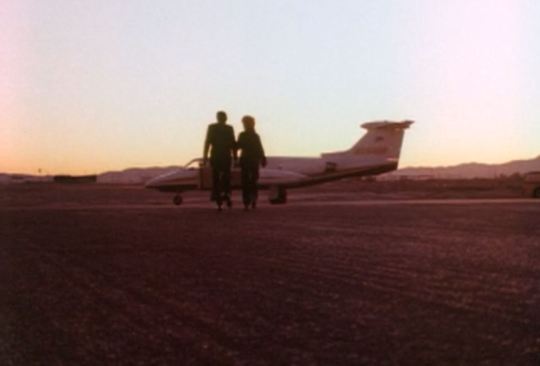
#Lucy Gets Lucky#Lucille Ball#Dean Martin#Las Vegas#MGM Grand#Vanda Barra#Bruce Gordon#Paul Picerni#Jack Donohue#Robert O'Brien#Jackie Coogan#Lee Delano#Ken Lane#Hal England#Joey Forman#Gino Conforti#Sid Gould#Gary Morton#Bonnie Boland#Joan Swift#Judith Wright#Jane Aull#Jay Jones#Roy Rowan#roulette#keno#Volare#Everybody Loves Somebody Sometimes#CBS#MPI Video
9 notes
·
View notes